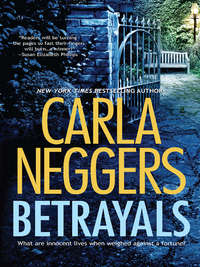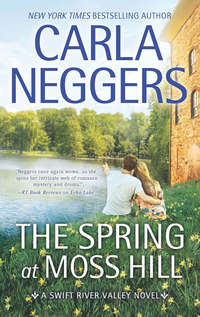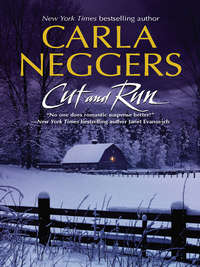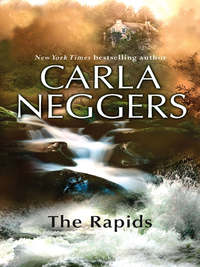
Полная версия
The Cabin
Jack couldn’t believe he was having a conversation with his daughters about the ramifications of his work on his relationship with his wife. “I liked you two better when I could stick you in a playpen. My work and my family life are separate. There’s a fire wall between them.”
“There! You said it!” Ellen pointed at him in victory. “You keep a part of yourself walled off from Mom. You don’t talk to her.”
Who was the one still pretending she wasn’t worth millions? He got to his feet. He should have ended this conversation the minute they’d said “woo.” It could go nowhere he wanted to go. He started for the kitchen. “Your mother knows the score with me and my work. I don’t need to tell her. She knows where she stands.”
“Yeah,” Maggie said half under her breath, “she sure does.”
His spine stiffened, but he decided to pretend he hadn’t heard that one, if only because he was putting his daughters on a plane in less than twenty-four hours. They’d be off on their own soon enough. They weren’t kids—they were young women. He couldn’t control their every word, thought and deed. Sometimes he wished he could. Like now.
At least their instinct was to defend their mother. Even if he were willing to fall on his sword over the problems in their marriage, take the blame for her move to Boston, say everything was his fault, it wouldn’t solve anything. It was going to take a hell of a lot more than lavender sachets and fresh roses to repair what they’d had.
He stormed out to the patio and kicked a chair. “A little goddamn honesty wouldn’t hurt.”
And he knew where it would begin—with his wife, not himself.
He could be stubborn, too.
Wooing Susanna. Taking her for granted. What did that mean? Susanna was about as unsentimental and unromantic as he was. What would she do if he started writing her poetry? He stared up at the clear south Texas sky and thought about Boston and its high today of eighteen degrees.
Maybe he didn’t get it.
He was still thinking about kicking more chairs when Maggie and Ellen headed out to the mall with a couple of their friends. Two minutes after they pulled out of the driveway, Alice Parker showed up at his front door. He’d forgotten how small she was. It was a wonder she’d made it through the police academy. She looked pale and tentative—the effects of her months in prison. Her blond hair was longer, pulled back in a prosaic ponytail, and she wore a white T-shirt, jeans and a lot of inexpensive gold jewelry.
“Afternoon, Miss Parker,” Jack said, his voice steady, formal. “If you have something to say to me, it can wait until I’m on duty. Not now. I don’t want you at my house.”
“I know—I know. I tried calling you, but they said you were off today.” Some of the tentativeness went out of her gray eyes. She was attractive—cute—but she looked tired, even drained. She met his eye. “I served my time, Lieutenant.”
“All right. What do you want?”
“To apologize.” She breathed in, her jaw set hard, as if the words were hard to get out. “I shouldn’t have asked you to look the other way. That was out of line.”
“Apology accepted.” He didn’t ask about the rest of it—the trampling of evidence, the witness tampering, the sense he had that she was still holding back on him. A murder remained unsolved at least partially because of her actions. “Get yourself a job, Miss Parker. Move on. Rebuild your life.”
“Beau McGarrity—he’s still a free man.”
Jack said nothing.
“I guess I’ll have to live with that. My police department—they’re not going to solve the case. You know that, sir. They don’t want it to be Beau, they don’t want to stir things up again. You know, people think I tried to frame him.”
“Miss Parker—”
“I’m thinking about moving to Australia.”
“Good luck.”
She smiled bitterly. “You don’t mean that. What do you hate worse, Lieutenant, that I paid a guy to lie about seeing Beau in the azaleas—or that I’m a royal fuck-up?”
“What I hate is seeing Rachel McGarrity’s murder go unsolved.” Jack narrowed his eyes on the younger woman. “There’s nothing else you want to tell me, Miss Parker?”
“Like what?”
“Why did the anonymous call to check out the McGarrity ranch come to you that night? And your relationship with Rachel McGarrity. I think you two were better friends than you’ve let on. Her murder isn’t my case, but you still haven’t told the whole story as far as I’m concerned.”
“Like you said, some things you just have to live with. See you around, Lieutenant.”
“Stay away from my house,” he said. “I don’t want you near my family.”
She shrugged. “Understood, sir.”
She left.
Jack decided it might be just as well that the girls were heading back to Boston in the morning. That Susanna was there. Alice Parker obviously hadn’t put Rachel McGarrity’s murder behind her. She’d had a year in prison to stew. Now she was free, and if she wanted to knock on his door on a warm January afternoon, she could do it. It didn’t break any laws.
Three
She couldn’t breathe.
Alice Parker had to pull over and concentrate on the breathing exercises she’d learned in prison to stop her panic attacks. She hated being cooped up. Even as a little kid, she couldn’t stand sleeping with the door to her room shut.
Ranger Jack scared the living shit out of her. He always had. She remembered the day he’d shown up to ask her a few questions. She’d known her goose was cooked. He was a hard man.
He’d never forgive her. She didn’t even want his forgiveness—she didn’t know what had possessed her to go out to his house. She just wanted money. A chance to start over in Australia and forget who she was, a little screw-up cop who’d made sure a murderer walked. Beau McGarrity had killed her friend and mentor, and he’d never be brought to justice for it.
Yeah, learn to live with it. Forget that. She planned to get some money off the murdering son of a bitch.
Feeling better, Alice drove to the small town where she’d spent all her life, except for her year in prison. She was driving a rusted little tank of a car that she’d bought from a fellow inmate’s mother for seven hundred dollars. She had to watch her finances. She’d been out of prison three days, and she’d already plowed through a good chunk of her savings. She had a job waiting tables downtown, but that was more for show than real income—it sure as hell wasn’t going to get her to Australia.
She gripped the steering wheel with both hands, feeling the familiar tightness in her chest, the physical longing, whenever she thought about Australia. She’d gotten as many books out of the prison library as she could on Australia and dreamed of it every night from the moment she’d decided that was where she wanted to be, where she wanted to start over. Sidney, Melbourne, Perth, Adelaide—any city would do. They’d talked to her in prison about setting attainable goals. Australia seemed attainable to her. She just needed the money to get there and get started.
The McGarrity ranch was out of town. It hadn’t changed in the past year. There were still the pecan and cypress trees, the live oaks, the huge azalea bushes in front of the sprawling, one-story house. Alice turned onto the long, paved driveway. Before she’d discovered Australia, she used to dream of living in a place like this and being a Texas Ranger. She’d downloaded the names and pictures of all hundred-plus Texas Rangers off the Internet and memorized them. Rachel McGarrity used to tell her about how, if she wanted something, she needed to visualize it, make it real to her. Then it was more likely to come to be.
Alice wasn’t so sure about that anymore. She’d never visualized herself in prison, but she’d sat in a cell for a year. The stink of it was still on her, and her skin was still gray and pasty. She hadn’t curled her hair or done her nails in months.
She parked in the spot where Rachel had parked the night she died and started to hyperventilate. She shut her eyes, controlling her breathing the way she’d learned from her yoga books and prison classes. She’d done everything she could to better herself in prison. She hadn’t wasted a minute. Her grandma would have been proud of her for that part, but at least she wasn’t alive for the other parts-the humiliation of her arrest, the cowardice of her plea bargain, the defeat of seeing Beau McGarrity remain a free man. Grandma had missed all that.
Rachel had loved it in south Texas. She said it was so different from the rich neighborhood in Philadelphia where she grew up. She’d been drawn to the romance of Texas, marrying a Texan—it blinded her to what she was really getting. A mean, crazy bastard who’d shoot her in the back and try to frame her best friend for her murder.
Best friend might be a stretch. Alice sighed, remembering how they’d only met because she’d stopped Rachel for a broken headlight. She’d invited Alice to meet her for coffee. Alice thought that was kind of weird, but she’d agreed. Rachel had slipped into the coffee shop like she was working for the CIA, and she’d talked about flowers and antiques until she finally got to the point—she wanted Alice to do some private investigative work for her.
Rachel was so fine-mannered and naive, so sincere, that Alice went against her better judgment and said sure, she’d do what she could. They met almost every day after that, for a month, and Alice was never too clear on what it was she was investigating—just that it involved Susanna Galway somehow. Rachel had all the pieces, the big picture, and it all seemed to evaporate when she was killed. Alice hadn’t ever told Ranger Jack about it. No one else mentioned anything, so she didn’t. It seemed like an invasion of privacy.
And she’d been afraid she’d end up dead if she said too much. Damn afraid. She remembered her horror when she’d spotted her change purse in a pool of Rachel’s blood on the driveway. It was monogrammed with her initials. Her grandma had given it to her for Christmas one year.
Her only thought had been to get rid of the change purse and scour the crime scene for any other incriminating evidence. Let people say she was a moron cop—she didn’t care.
Later, she’d realized that was what Beau had expected her to do. Panic and contaminate the crime scene, make it impossible for the evidence to lead investigators to him. Alice had felt stupid, like an unwitting co-conspirator. In the midst of her self-loathing, she’d come up with the idea of her bogus eyewitness. Beau hadn’t expected that—she remembered the edge of panic in his voice that day in Susanna Galway’s kitchen, when he’d tried to get Susanna to intervene with her husband on his behalf.
But that wasn’t the only reason he’d gone to see Susanna. She had some connection to what all had gone on, but Alice didn’t know what.
In any case, her fabricated eyewitness hadn’t worked out. Jack Galway had seen to that.
Alice took the curving rock walk to the front door, which opened just as she got to the steps. Beau McGarrity came out. It was a clear, cool afternoon, squirrels chattering in nearby trees. In summer, there’d be a field of sunflowers out back, although Beau leased out most of his land to working ranchers. He just owned the place for show. Rachel had bought into the rugged image he wanted to project. He was a tall man with neat, gray hair, a square jaw and blue eyes. He had the broad shoulders and build that had served him well as a college football player. He and Rachel were married within weeks of meeting while she was in Austin on business. She was his second wife. His first wife, his high school sweetheart, had died of cancer three years earlier. She was a saint, a hard act to follow. No kids.
“Miss Parker,” Beau McGarrity said in his deep, twangy accent, “if you don’t leave at once, I’ll call the police.”
He didn’t like her coming around anymore than Jack Galway had. “Relax, Mr. Beau, I’m not here for a little vigilante justice. I have a proposition for you.”
“Miss Parker, there’s nothing you can offer that would be of any interest to me whatsoever.”
Alice shrugged. She felt tiny and pale next to him, isolated out here on his precious ranch, but not vulnerable—not like that night when she’d found Rachel out here in the dark. She remembered screaming like a damn fool, crouching behind Rachel’s car, expecting a bullet in her back, before she realized Beau needed her alive. As Rachel’s murderer.
“Susanna Galway taped you that day you showed up in her kitchen.”
His eyes narrowed on her, but he said nothing.
“Her daughters had one of those little digital tape recorders, and Susanna saw it and hit the record button.” Alice was matter-of-fact. “I’m surprised you didn’t notice.”
“This is ridiculous. You’re making this up.”
“No, sir, Mr. Beau, I am not making this up. I am telling you the flat-out truth. It’s not a regular cassette tape. It’s a digital audiotape, about three inches by three inches. I’ve listened to it. You know all that sympathy you’ve been building up this past year? All these people who’re thinking, oh, poor Mr. Beau, he’s the innocent victim of police corruption and incompetence—well, let them hear you threatening a Texas Ranger’s wife.”
“I didn’t threaten her.”
“You were subtle,” Alice said, “but not that subtle.”
“Get off my property. You’re trying to set me up again. I’ve been under suspicion for months of killing my own wife—”
“You did kill your own wife, Mr. Beau. You killed her because you’re paranoid and crazy. Not twenty-four hours before I found her dead out here, I told you that if I were her, I’d smother you with a pillow while you slept, and you killed her—”
“I’m calling the police.” He turned to go back inside.
She held up a hand, breathing hard. “No, wait. I’m sorry. That’s all over with. Let me finish.”
He said nothing, but he stayed put.
Alice went on. “I happened to show up at the Galway house right after you left—I was hoping to catch Ranger Jack and plead my case to him. It was just a few hours before I was arrested, and here’s Mrs. Jack Galway, all pale and scared, telling me how you’d just walked into her kitchen and she’d taped you. I assumed she’d give the tape to her husband, but she never did, probably because everything was such a big mess by then. Why drag herself into it?”
Beau straightened, recovering a bit from his shock. “This tape. You believe Mrs. Galway still has it in her possession?”
This was the tricky part. Alice remembered how Rachel had often warned her against making things too complicated. But she couldn’t tell Beau that Susanna Galway had thrust the tape at her that day at her front door—Susanna obviously had thought Alice was still on Rachel’s murder investigation and wanted to be rid of the damn thing. “I don’t know if it’s any good,” she’d said, “but, please, take it.”
Alice had gone out and bought a tape recorder and listened to the DAT herself. There was nothing on it that would pull her own hide out of the fire, nothing a prosecutor would bother with as far as Beau went. The Texas Rangers wouldn’t like it, a murder suspect trying to get under the skin of the wife of one of their lieutenants. Jack Galway really wouldn’t like it. But, too bad.
She’d expected Jack to get around to asking her about it when he’d come to arrest her, but he never did. Alice didn’t volunteer. Let the Texas Rangers work for every damn thing they got out of her. Her world had crashed in on her while Beau McGarrity got away with murder, everything.
She’d put the tape out of her mind. It was worthless. Irrelevant.
Then, in prison, she’d started dreaming of Australia.
She still had the tape, and she was betting Beau would want it. It wasn’t enough to nail him for murder, but it was plenty to ruin his chances of any kind of political comeback—provided no one realized Alice Parker, corrupt cop, had had it all this time. If he knew that, Beau would never pay. He wouldn’t have to. He’d just say she was back to her old tricks, tampering with another bit of “evidence.”
She shifted away from him, looking out at the sprawling, shaded lawn. She loved the smells. “I happen to know Susanna still has the tape. That’s why I’m here. I can get it for you.”
“Miss Parker, you managed to get yourself thrown in prison because of your own incompetence and your zeal to pin my wife’s murder on me. Why should I believe anything’s changed? Why shouldn’t I believe this is just a ploy on your part to entrap me, frame me for something I didn’t do?”
“You can quit professing your innocence, Mr. Beau. You already got away with murder. There’s nothing I can do about that—I don’t even care anymore. It’s time I looked after my own interests.” Alice shifted back to him, squinting, noting that she wasn’t even slightly nervous. “I want fifty thousand dollars to start a new life.”
He scoffed. “Do you actually think I’d pay you fifty thousand dollars for anything?”
“Not just anything. For a tape of you creeping out Susanna Galway in her kitchen.”
“If there’s anything on this tape that should concern me—if it even exists—why wouldn’t Mrs. Galway have given it to her husband by now?”
“Probably because you scared her shitless that day. I don’t know.” Alice paused, shrugging. “Look, Beau, I know you, and you’re going to chew on this until you can’t stand it. The idea of that tape being out there, out of your control, is going to drive you crazy.”
“She could have made copies.”
“Unlikely. I think she just wants to forget it exists.”
“Then why not destroy it?”
“She’s the wife of a Texas Ranger. She’s not going to destroy potential evidence, even if she doesn’t believe it’ll amount to anything. If she has, end of story. I only get the money if I produce the tape and no copies of it turn up within a reasonable period of time.”
He tilted his head back, staring down at her in that superior way of his. At first, Rachel had said, she’d thought it was confidence—she hadn’t seen the truth until later. Her husband was one cold, arrogant son of a bitch. He’d put his first wife on a pedestal after she died, then tried to put Rachel on one, too, but she could never measure up. She was real. His dead wife was a mirage.
“Miss Parker—”
It used to be Officer Parker. She remembered that. She knew everyone in town, and they’d all called her Officer Parker. “Think about it,” she said. “I’ll call you in a few days.”
“This is extortion. Blackmail. You can’t—”
“I’ll be in touch, Mr. Beau.” She started down the walk, breathing in the fresh smells of his yard. She’d grown up in this country. It was home. But she could get used to Australia. She wanted the chance. She glanced back at Beau McGarrity, still standing on his front steps, probably thinking about where he could bury her out back if he decided to wring her neck. Just as well he didn’t know she had Susanna’s tape in her glove compartment. “Now, you aren’t going to tell the Texas Rangers about our visit, are you?” she called back over her shoulder.
“Get out.”
She smiled sweetly. “I didn’t think so.”
* * *
A nor’easter was blowing up the coast, promising to dump up to a foot of snow in Boston. Susanna noticed the first fat, wet flakes as she walked back to Gran’s from her subway stop. With a full schedule of client meetings, she’d avoided taking her car into the city. It had been a good day. Helping people sort out their finances and set up goals was one of the real pleasures of her work. It wasn’t just about money, numbers, calculations—it was about people and their lives. She had clients saving for their kids’ college, a first home, a year off to volunteer for something like Doctors Without Borders. One client was digging herself out of debt after a cancer scare and a deep depression that had nearly caused her to pull the plug on her life. Now she was excited, eager to knock off one credit card debt after another.
Susanna wasn’t as good at following her own advice. She always told couples to talk about money. What did it mean to them? What positives and negatives did they associate with money from their childhoods? What did they want it to do for them, individually, as a couple?
She and Jack had stopped talking about money beyond the absolute basics. If the bills were paid and they had walking-around money, Jack didn’t care about the rest. “Accumulating wealth” fell somewhere after “watching gum surgery” on his list of things he was excited about in his life.
Some days Susanna thought he wouldn’t care that she’d invested her money and a chunk of his money, and, now, together, they had a net worth of ten million.
Some days she thought he’d care a lot. And wouldn’t like it. That he especially wouldn’t like that she hadn’t told him. Not that he’d asked. Not that he’d shown any interest whatsoever.
In the months before she’d headed north to join Maggie and Ellen, he’d talked very little about his own work. Things hadn’t been right between them even before Beau McGarrity had walked into her kitchen.
The wind picked up, slapping her in the face as if to get her attention. Maggie and Ellen had been back five days, still filled with tales of friends, vintage clothing scores, Jane Austen, and Dad this and Dad that. Susanna was pleased they’d enjoyed their visit home, and they’d had the grace to say they’d missed her. She wondered if they’d be happy about the snow.
She turned up Gran’s narrow street of mostly big, multifamily homes built in the late nineteenth and early twentieth century. Iris Dunning had managed to buy one of the few single-family houses on the street, an 1896 two-story stucco with a glassed-in front porch, an open back porch and a detached one-car garage, not that common in crowded Somerville. She’d planted flowering trees and perennial gardens, battling skunks, cats, raccoons and the occasional neighborhood miscreant.
Susanna kicked off her boots in the front hall and found her daughters doing their homework in the dining room. Gran was already off to Jim’s Place for clam chowder. She never missed chowder night.
“Dad called,” Maggie said. She was wrapped in a 1950s shawl she’d found in Gran’s attic and had on fingerless Bob Cratchit gloves. Drama, Susanna thought. Gran liked to keep the house cool, but not that cool. “He wants you to call him back. He said to call him on his cell phone.”
Ellen looked up from her laptop. “We told him about the snow. Mom, can you believe less than a week ago we were in south Texas and now it’s snowing? I hope they cancel school.”
Susanna smiled. “Be careful what you wish for. Gran’ll put you to work shoveling.”
She grabbed the portable phone off the clunky dining room table and sat in a chair badly in need of refinishing. It was a comfortable, lived-in room with its dark woodwork and flowered wallpaper. Her parents liked to tease Gran about coming in and redoing the place, stripping the wallpaper, tearing up the rugs, getting rid of all her tacky artwork, but she paid no attention. She was happy with her house just the way it was. As long as the roof didn’t leak, she didn’t plan to change a thing.
Susanna dialed Jack’s number, and he answered on the first ring. “I’m on the patio,” he said, laying on his slow, deep Texas drawl. “It’s a beautiful night.”
“Liar. It’s in the fifties and raining.”
“Ah. You checked.”
“Only because we’re tracking a nor’easter. Thank God it didn’t blow in last week when the girls were flying. What’s up?”
“I wanted you to know Alice Parker is out of prison. She took a room in San Antonio for a few days. Now she’s gone. Her friends in prison say she was obsessed with Australia. Maybe she’s headed in that direction.”
His voice was businesslike, but not matter-of-fact. Susanna glanced at the girls, both pretending not to be listening. Maggie was frowning over her math homework, Ellen tapping keys on her laptop.
“She’d need a passport, money—” Susanna took a breath, noticing that Maggie and Ellen were no longer making any pretense of studying. “Jack, are you worried she’ll come after you? You investigated her. She thinks it’s your fault no one’s ever been charged in Rachel McGarrity’s murder.”









